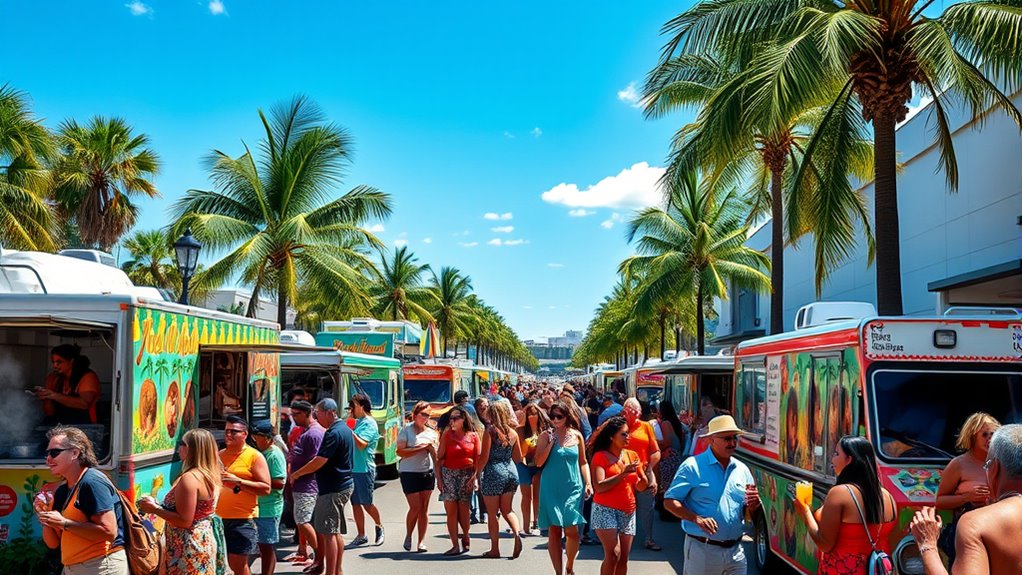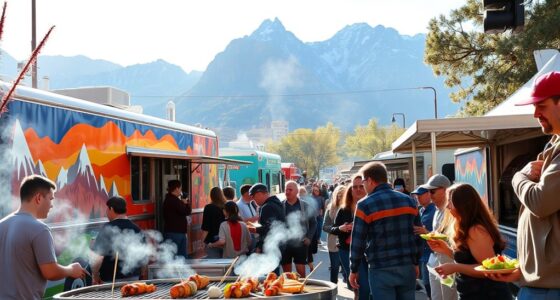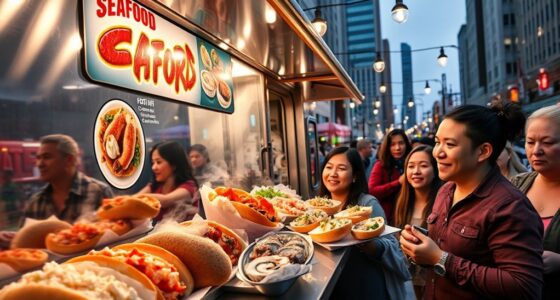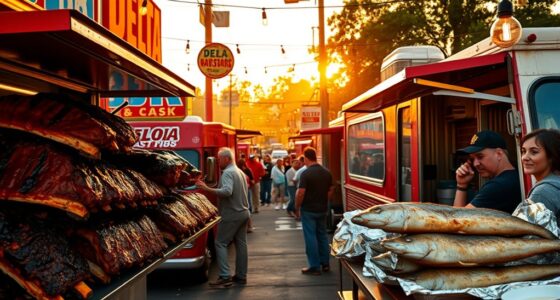Discover Jacksonville’s vibrant Latin and Caribbean food trucks, where bold flavors, cultural traditions, and innovative dishes come together. From jerk chicken and oxtail stew to Korean BBQ tacos and fusion bowls, these trucks reflect the city’s diverse community and entrepreneurial spirit. They often serve neighborhoods, festivals, and events, offering more than just food—they share stories and heritage. If you keep exploring, you’ll uncover how these trucks continue to shape Jacksonville’s dynamic street food scene.
Key Takeaways
- Jacksonville’s diverse population supports a vibrant scene of Latin and Caribbean food trucks serving authentic and fusion dishes.
- Popular menu items include jerk chicken, oxtail, empanadas, tacos, and Latin-style bowls with fresh sauces.
- Food trucks operate at hotspots like downtown, neighborhood markets, parks, and special events such as River City Eats.
- They enhance community access to ethnic cuisines, often in food deserts, while promoting cultural heritage and entrepreneurship.
- Regulatory challenges are addressed through safe vending zones, sustainable practices, and technological innovations for growth.
The Rise of Caribbean Food Trucks in Jacksonville
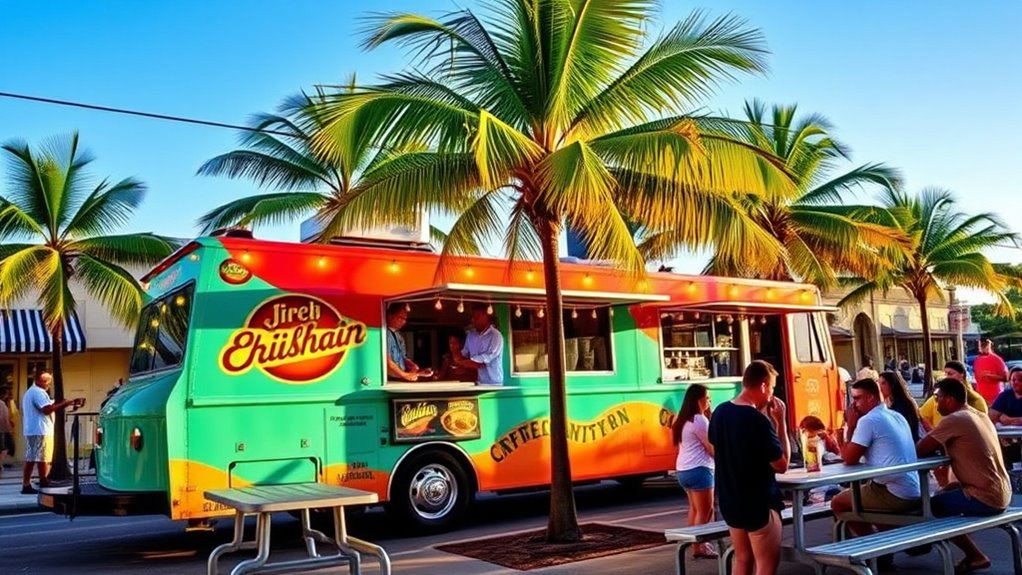
The rise of Caribbean food trucks in Jacksonville reflects a combination of changing consumer tastes and entrepreneurial opportunities. As people seek diverse, ethnic street food options, Caribbean vendors meet this demand with vibrant flavors and authentic dishes. Jacksonville’s multicultural population fosters curiosity and acceptance, making it easier for these trucks to thrive. Low startup and operational costs attract Caribbean entrepreneurs enthusiastic to share their cuisine. Social media and delivery platforms like Uber Eats expand their reach, drawing in new customers. Local events and festivals provide ideal venues, boosting visibility and sales. The diverse culinary landscape also benefits from the growing popularity of street food culture, encouraging more vendors to enter the scene and serve the community. Together, these factors create a thriving scene that celebrates Caribbean culture while satisfying Jacksonville’s growing appetite for unique, flavorful street food. Delivery options via Uber Eats further facilitate access to these culinary delights, making it easier for residents and visitors alike to enjoy Caribbean flavors from the comfort of their homes.
Highlighted Dishes From Caribbean Cuisine in Jacksonville
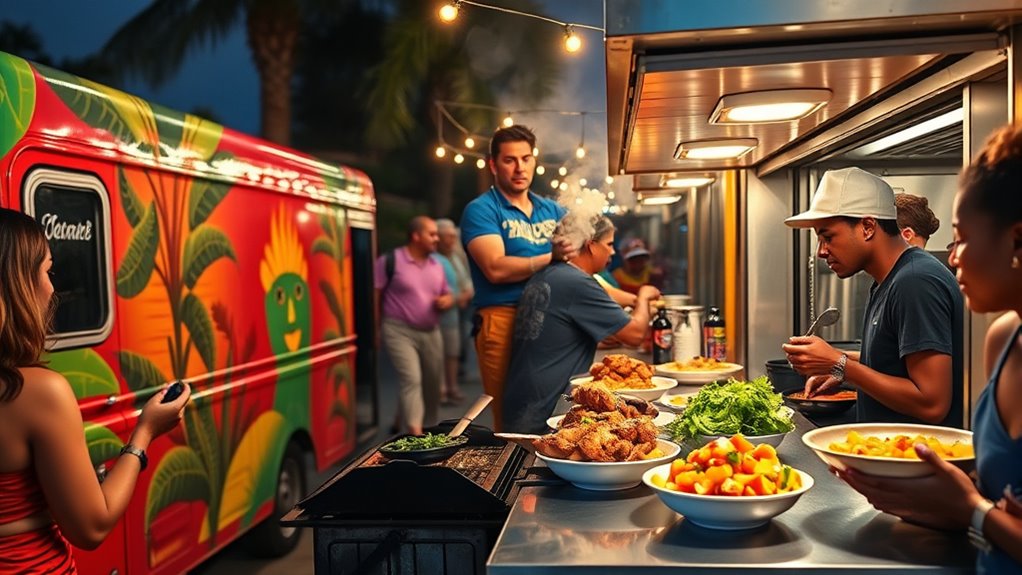
Caribbean food trucks in Jacksonville serve a vibrant array of standout dishes that showcase the rich flavors of the islands. Jerk chicken, marinated in spicy seasoning and often smoky and fiery, is a must-try. Oxtail stew, slow-cooked until tender in a savory sauce, offers deep island flavors. Curry goat, seasoned with fragrant Caribbean spices, provides a hearty, authentic experience. You’ll also find brown stew shrimp and stewed beef, both hearty and spiced with island herbs. Saltfish dishes with salted cod, peppers, and onions are staples in authentic Caribbean cuisine. Stars Caribbean Restaurant, known for its robust jerk spice on chicken and traditional favorites, exemplifies the flavorful depth of Caribbean cooking. These trucks often serve sides like rice and peas, fried plantains, and stewed cabbage, balancing hearty main courses with flavorful, colorful accompaniments. The bold flavors and traditional recipes make Caribbean dishes in Jacksonville truly memorable. Additionally, many of these trucks incorporate cultural authenticity by using traditional cooking techniques that preserve the unique island flavors.
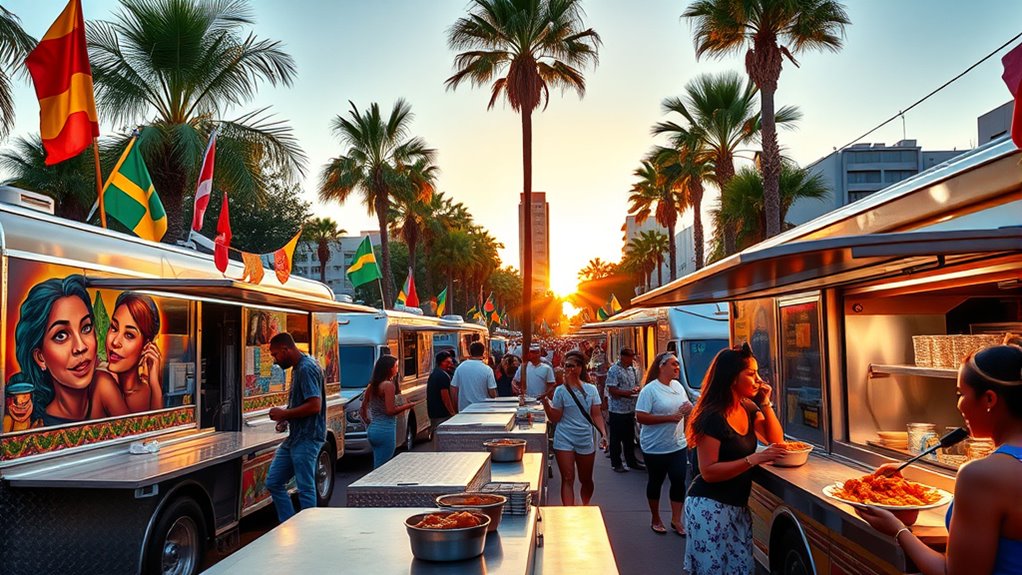
Curious about the vibrant flavors taking over Jacksonville’s food truck scene? You’ll find exciting Latin fusion dishes that deliver bold tastes and creative twists. Korean BBQ Bulgogi Tacos combine marinated beef with traditional taco formats, offering a savory punch. Chipotle-glazed plantains add a sweet, smoky kick, perfect as a side or topping. Latin-style wraps and tacos feature fillings like marinated pork, chicken, or beef, wrapped in handmade tortillas. Freshly made Latin sauces—salsas, crema, and guacamole—enhance every bite with authentic flavor. Innovative bowls blend ingredients from various Latin regions, with rice, beans, grilled meats, and fresh produce. These popular menu items showcase how Jacksonville’s food trucks celebrate Latin culinary diversity with handcrafted sauces, local ingredients, and fusion creativity. Food trucks in Jacksonville often incorporate local ingredients to create authentic and innovative Latin dishes. Additionally, understanding Latin culinary diversity helps appreciate the variety of flavors and techniques present in these vibrant dishes.
The Cultural Significance of Family-Owned Food Trucks
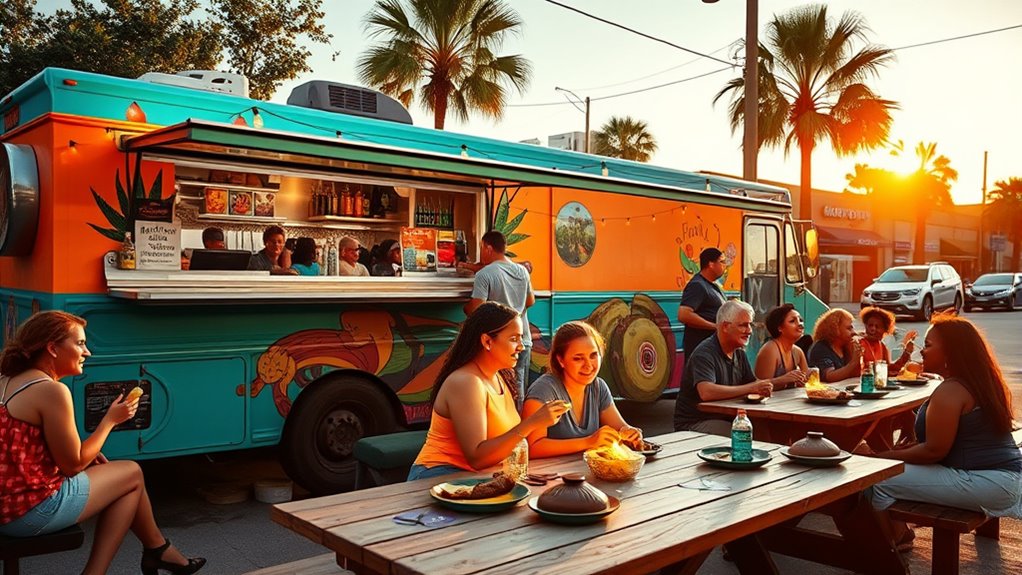
Family-owned food trucks play a crucial role in shaping Jacksonville’s cultural landscape by serving as living bridges to Latin and Caribbean traditions. They act as cultural ambassadors, preserving and sharing culinary heritage across generations while fostering community pride and social bonds. These trucks often operate in neighborhoods identified as food deserts, providing affordable, culturally relevant meals that improve food access and security for lower-income residents. Supporting these businesses isn’t just about good food—it’s about investing in local entrepreneurs and honoring cultural identities. Many owners see their trucks as a way to keep traditions alive, creating communal spaces where diverse customers connect. Despite regulatory and economic challenges, these trucks demonstrate resilience, highlighting their essential role in both cultural preservation and community development. The city’s recent closure of a community hub food park underscores the importance of supporting small businesses that serve these communities. Additionally, these trucks foster cultural continuity by passing down recipes and traditions that might otherwise be lost over time.
Navigating Jacksonville’s Food Truck Hotspots
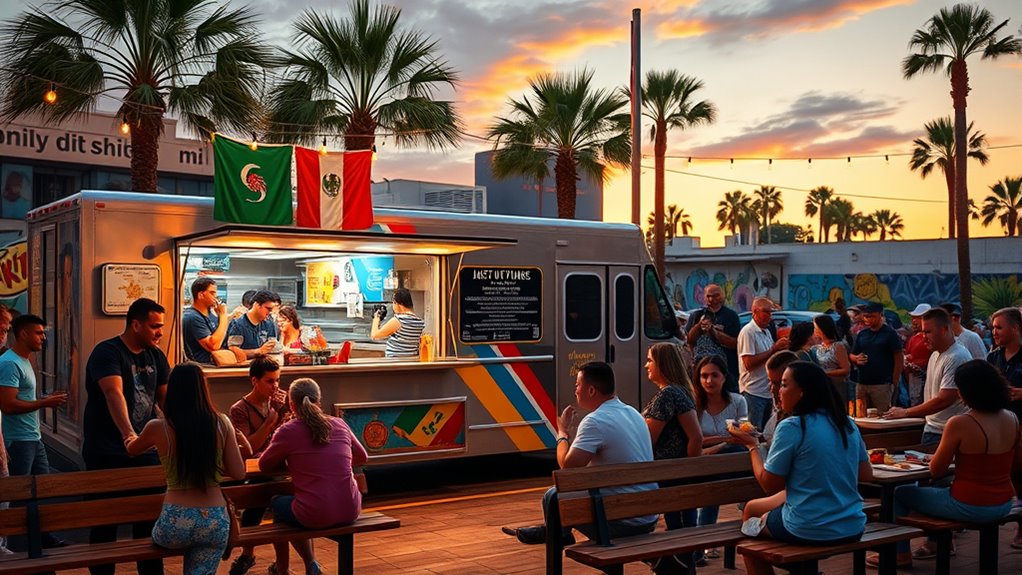
Jacksonville’s food truck scene flourishes in key hotspots that attract locals and visitors alike. Downtown’s urban food courts, like 17 S Hogan St, host diverse trucks, including Latin and Caribbean flavors, especially during lunch hours. Revitalization projects boost the growth of ethnic cuisine vendors, making downtown a vibrant hub for quick bites. Neighborhoods like San Marco, Riverside, and Murray Hill feature clusters of food trucks at parks and community centers, often during weekend markets and festivals. Regular rallies and weekly events, such as River City Eats, showcase Latin and Caribbean dishes, drawing crowds. Strategically placed near military bases, colleges, and tourist spots like Jacksonville Beach, trucks adapt menus and hours to serve diverse customer bases, ensuring you find authentic flavors almost anywhere in the city. Understanding the offensive security measures employed by ethical hackers helps explain how these food trucks protect their digital and physical assets from potential threats.
Catering and Community Events Featuring Latin & Caribbean Cuisine
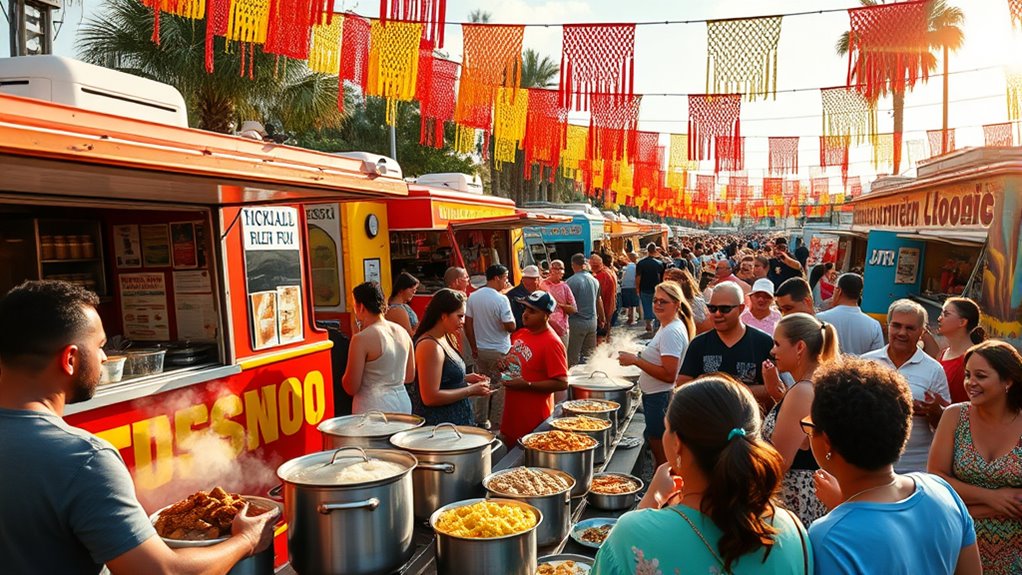
Catering and community events in Jacksonville often feature Latin and Caribbean food trucks, bringing authentic flavors directly to local gatherings. These trucks offer customizable menus that blend traditional dishes with innovative fusion options, satisfying diverse tastes. Many operate on a booking basis, providing quick, reliable service for private parties, weddings, and corporate events. Popular offerings include tacos, Caribbean baked goods, and barbecue, reflecting genuine cultural tastes. Family-owned trucks like Josie’s Latin Fusion or Caribbean Sunrise emphasize community connection, sourcing ingredients locally when possible. At festivals, cultural celebrations, and farmers markets, these trucks support events that highlight Latin and Caribbean heritage. Their presence enriches Jacksonville’s social scene, fostering cultural appreciation while offering delicious, accessible cuisine that unites communities. Additionally, they often adhere to local building codes and permits, ensuring safety and compliance during operations.
Trends Driving Menu Innovation in Food Trucks
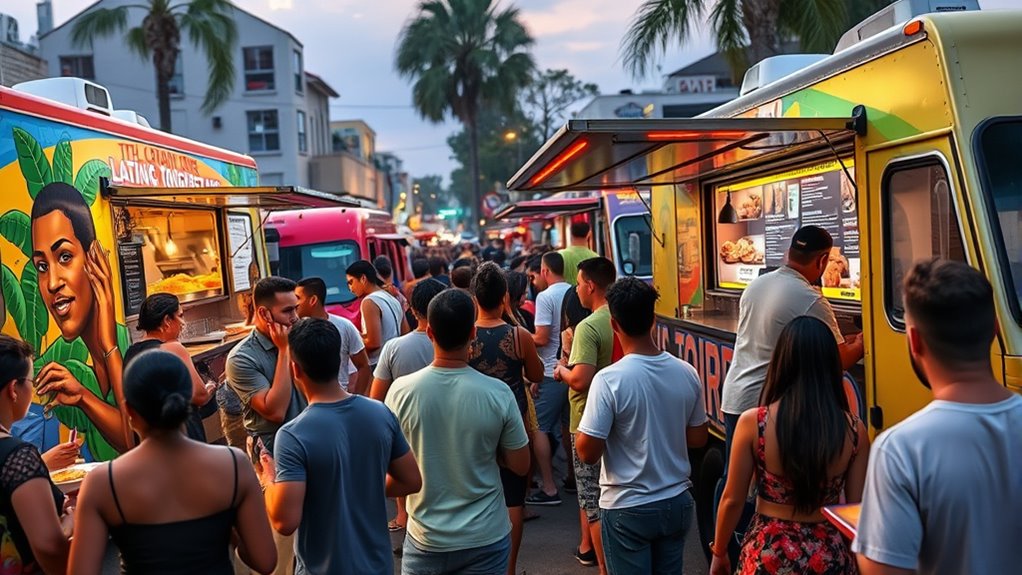
You’ll notice food trucks are increasingly exploring fusion flavors that blend different cuisines to excite your taste buds. At the same time, many are offering health-conscious options, like plant-based dishes, to meet growing demand for nutritious, sustainable choices. These trends keep menus fresh, innovative, and aligned with what modern diners seek. Additionally, incorporating dynamic communication exercises can help vendors better understand customer preferences and improve service delivery.
Fusion Flavors Expanding Horizons
Have you noticed how food trucks are pushing culinary boundaries by blending diverse flavors? They’re creating exciting cross-cultural mashups, combining Latin American staples with global cuisines. Imagine Korean BBQ bulgogi tacos or chipotle-glazed plantains—unexpected yet delicious. Many trucks mix Cuban-style pulled pork with Colombian beef, adding layers of flavor. Caribbean jerk spices often find their way into Latin dishes, reflecting Jacksonville’s vibrant Caribbean-Latin scene. These fusion menus feature empanadas, arepas, and tacos with creative twists, attracting adventurous eaters seeking novelty. This trend not only diversifies offerings but also keeps menus fresh and engaging. By blending traditions and experimenting with flavor pairings, food trucks expand culinary horizons, making Latin and Caribbean cuisine more innovative and appealing to a broader audience. Culinary boundaries are being redefined as chefs embrace creativity and cultural exchange.
Health-Conscious Menu Choices
Are food trucks leading the way in health-conscious dining? Absolutely. Many now include plant-based and vegan options, like jackfruit tacos and vegan rendang bowls, to meet rising demand. These choices offer lower cholesterol and calories, often using plant proteins like Impossible and Beyond Meat. Sustainability also plays a role, with trucks adopting biodegradable packaging, sourcing locally about 40% of ingredients, and minimizing waste. Menus feature high-protein, low-carb, keto, paleo, and gluten-free options, incorporating superfoods and allergen-aware recipes. Technology helps too, with apps for pre-ordering healthy meals and digital menus highlighting nutritional info. Additionally, energy-efficient systems can support the refrigeration and cooking equipment, reducing overall energy consumption. Plus, seasonal and hyper-local ingredients ensure freshness, supporting community farmers and reducing environmental impact. Consumer demand for healthier options is increasing rapidly, influencing menu design across the industry. All these trends make healthy, flavorful Latin and Caribbean dishes more accessible on the go.
How Social Media Shapes Customer Engagement and Loyalty
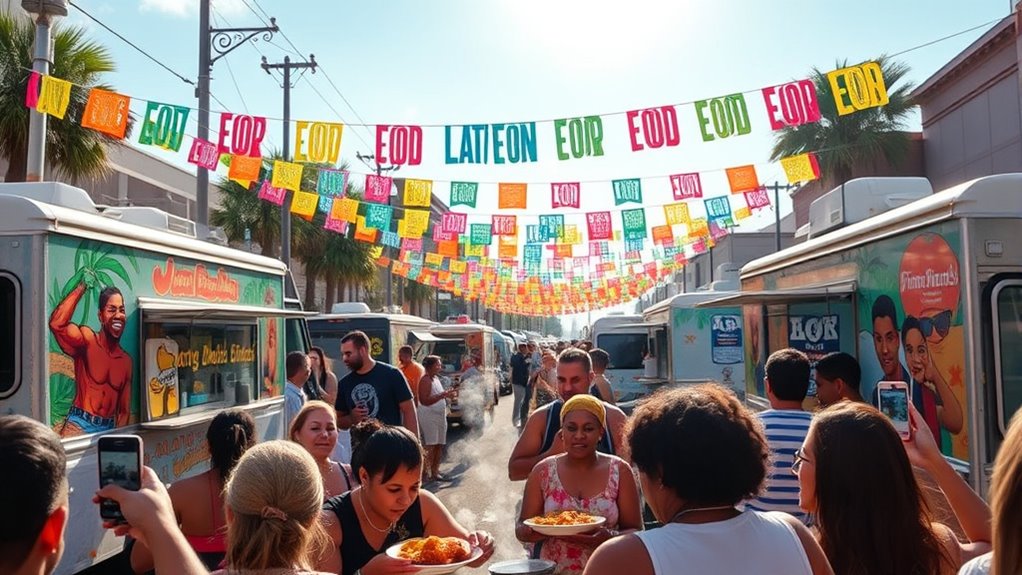
Social media plays a crucial role in shaping customer engagement and loyalty for food trucks in Jacksonville. It allows you to communicate directly with your customers, sharing daily specials and location updates in real-time. Visual content like food photos and customer stories serve as powerful word-of-mouth, enticing new visitors. Responding promptly to comments builds trust and encourages repeat business. You can also promote loyalty programs and exclusive offers, turning followers into loyal fans. Here’s how social media impacts you: cookie policies and user consent These tools help you connect culturally, build community, and stand out in Jacksonville’s vibrant food scene.
Future Directions for Latin and Caribbean Food Trucks in Jacksonville
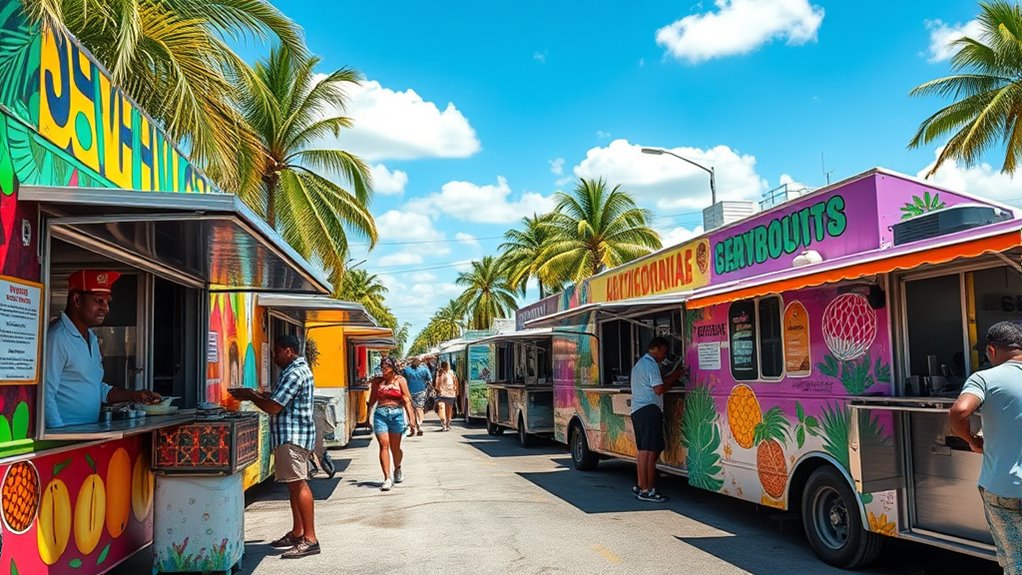
Despite regulatory challenges, Latin and Caribbean food trucks in Jacksonville are poised for growth by exploring new locations and innovative business models. The recent ordinance banning trucks at gas stations pushes you to diversify into commercial and community spaces, especially in the South Side and Orange Park. This shift can open opportunities to serve underserved neighborhoods and support economic inclusion. Embracing technology—like mobile ordering and contactless payments—can boost efficiency and attract more customers. Additionally, adopting sustainable energy sources such as electric or propane alternatives helps meet safety standards while reducing fire risks. Food truck fires have increased and collaborating with local government and community groups to create safe vending zones ensures compliance and fosters community support. These strategies position Latin and Caribbean food trucks for a vibrant future, celebrating cultural heritage while adapting to Jacksonville’s evolving regulatory landscape.
Frequently Asked Questions
How Do Caribbean and Latin Food Trucks Ensure Authentic Recipes?
You can guarantee authentic recipes by sourcing genuine ingredients directly from Caribbean and Latin American markets or importing them. Use traditional techniques like marinating with adobo or slow-cooking, and incorporate family heirloom recipes. Building relationships with ethnic suppliers and engaging with the community helps maintain authenticity. Balancing traditional flavors with local ingredient substitutions, while sharing the cultural story behind each dish, also keeps your recipes true to their roots.
Are Vegan or Gluten-Free Options Commonly Available on These Trucks?
You’ll find that vegan and gluten-free options are becoming more common on Latin and Caribbean food trucks. Many trucks offer customizable dishes like rice, beans, plantains, and veggie stews that suit these diets. While dedicated vegan or gluten-free items are still limited, vendors are increasingly accommodating dietary needs due to rising demand. Always ask about ingredients and cross-contamination to enjoy authentic flavors safely and confidently.
What Are the Typical Pricing Ranges for Dishes From These Food Trucks?
Your curiosity about prices feels like searching for a needle in a haystack, but it’s actually pretty straightforward. Typical main dishes run between $8 and $15, with combos around $10 to $14. Sides like plantains cost about $4 to $4.50, and beverages usually stay under $4.50. You can snag a flavorful street food feast without breaking the bank, making it easy to indulge your cravings affordably.
How Do Food Trucks Adapt Menus for Local Jacksonville Tastes?
You adapt menus for Jacksonville tastes by sourcing local ingredients like seafood and tropical fruits, balancing spice levels to suit regional preferences, and offering familiar American fusion options. You simplify dishes for quick service, incorporate seasonal and cultural themes, and provide customizable spice levels. Additionally, you consider dietary trends, adjust portion sizes, and use local landmarks or slang in menu names to connect with the community and enhance customer appeal.
What Permits or Regulations Do Caribbean and Latin Trucks Need to Operate?
Think of Jacksonville’s permit maze as a sprawling jungle you must navigate. You’ll need a Florida DBPR Mobile Food Service License, a food permit from FDACS if serving raw or prepackaged foods, and registration with the Florida Department of Revenue for sales tax. Plus, get a local business tax receipt, pass fire and health inspections, and make certain zoning compliance. Only then can your Caribbean or Latin truck hit the streets legally and safely.
Conclusion
Did you know that Jacksonville’s Caribbean food trucks have grown by over 40% in the past two years? As you’ve explored, these vibrant trucks bring bold flavors and cultural stories to every street corner. Whether you’re craving spicy jerk chicken or flavorful Latin tacos, there’s a truck for you. So next time you’re out and about, seek out these mobile kitchens—you’ll enjoy delicious food and support local families keeping Caribbean and Latin traditions alive.
